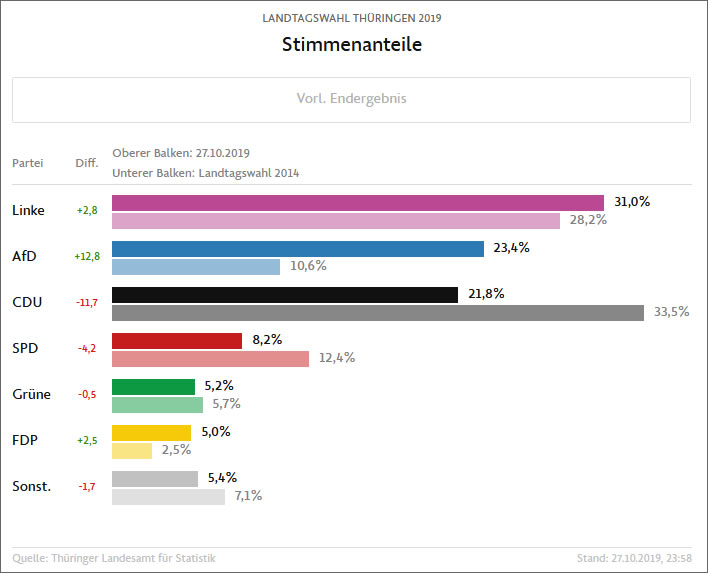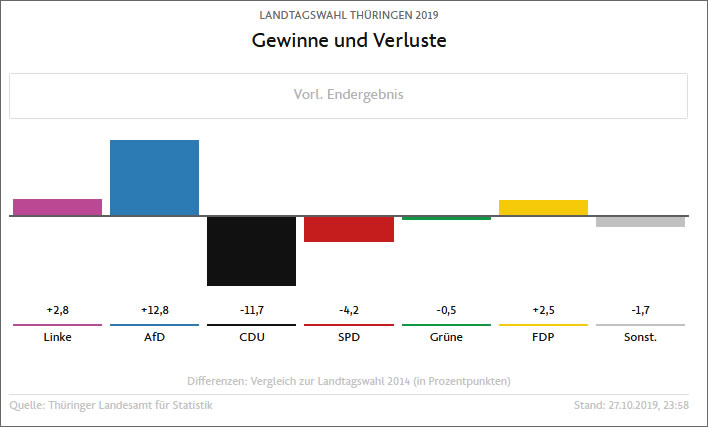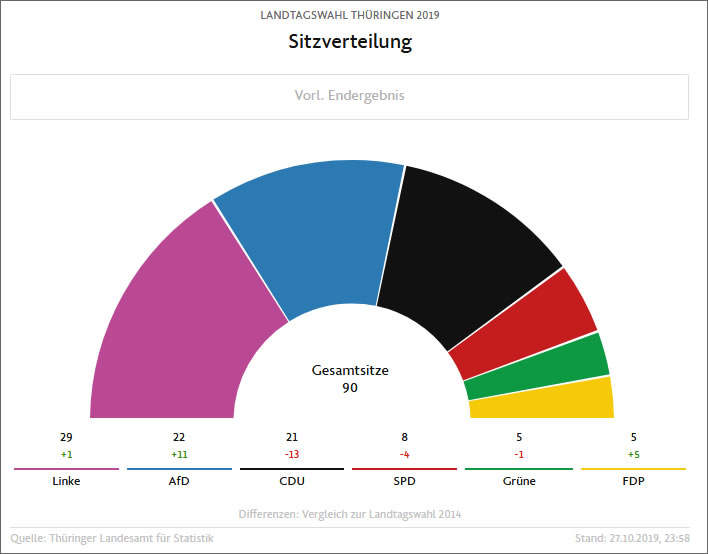Thuringia has voted!
Posted by Mad Mitch on UTC 2019-10-28 11:14
The results of yesterday's state election in Thuringia can be summed up in one word: 'baffling'.

Percentage of votes cast. The upper bar of each pair is the result for the current election, the lower bar the result for the previous election (2014). Image: Thüringer Landesamt für Statistik / FAZ [provisional results from 27.10.2019, 23:58].
The bafflement only exists, however, in the minds of political commentators who fall into the trap of ascribing the votes cast for this or that party as expressing some coherent popular will or sentiment. They don't. At least on this occasion, though, a respectable 64.9 percent of the electorate stirred themselves to cast a vote.

Gains and losses. Can't be much clearer than that. Image: Thüringer Landesamt für Statistik / FAZ [provisional results from 27.10.2019, 23:58].
In the present case, for example, the 2.8 percent increase in the vote for the party Die Linke, 'The Left', the hard-left party of the incumbent State Prime Minister, Bodo Ramelow, is almost universally ascribed to the feeling in the minds of those who voted for The Left that he had done a reasonable job so far in the circumstances and so ought to be able to continue in that vein.
Of course, the opiners cannot possibly know what is 'in the minds' of those who voted for The Left.
Let's face it, too, that in the normal political world a 2.8 percent increase in the vote barely moves the needle on the scale, let alone indicates the approval of the masses. It only seems exceptional when the field of battle also contains the walking-wounded of the two main, historically dominant 'people's parties', the CDU (centre-right) and the SPD (left), both of which suffered massive losses of 11.7 percent and 4.2 percent respectively.
We realise the depth of that humiliation when we recall that these two parties make up the coalition government currently running federal Germany.
It is surely quite bizarre for commentators to conclude that, just because Ramelow and his party didn't lose, but instead had a small gain, that fact represents a vote of approval for him and his party. The truth is that nearly 70 percent of the voters rejected 'The Left'. The votes denied to the CDU and the SPD had to go somewhere.
We know where they did not go. The 'spare' votes did not go to the Green party for they, too, lost support and only just jumped the five percent hurdle required to get into the state Parliament at all. The green wave we have observed in Germany and Switzerland this year fizzled out in Thuringia. The FDP, the 'Liberals' (in the old-fashioned sense of economic probity), had a 2.5 percent gain, which was just enough to heave them into Parliament, too. Just enough.
The spare votes went to the AfD, the 'Alternative for Germany', who experienced a 12.8 percent increase in their vote, making them the second strongest party in Parliament. From a standing start at the 2014 election, where it gained 11 seats, the party has now doubled the number of its seats. That change, combined with the desperate losses of the traditional 'people's parties', the CDU and the SPD, overshadows this whole election.
On this battlefield, three warriors are left standing: The Left (29 seats), the AfD (22 seats) and, dripping blood, the CDU (21 seats) – the others are barely-alive irrelevancies (SPD 8, Green 5, FDP 5 seats).

Distribution of seats in Parliament. Image: Thüringer Landesamt für Statistik / FAZ [provisional results from 27.10.2019, 23:58].
A parliamentary majority in Thuringia requires 46 seats. Even in a normal German political environment, achieving that majority with a coalition appears to be a very difficult task. 'The Left' is a rebranding of the remnant of the communists who ran the one-party state of East Germany in the monolithic SED. Noses would have to be held were The Left and the CDU to sit in the same room together, but German politicians are expert at holding their noses – that is, after all, how coalitions work. The leader of the CDU in Thuringia, Mike Mohring, in the hours after his electoral disaster is now no longer ruling out a coalition with that devil.
One situation in which German politicians refuse to hold their noses is the prospect of a coalition with the AfD. The have all categorically rejected any cooperation with the new devil on the block.
When the AfD was still a small party and the coalitions were much easier, that rejection had more symbolic than practical value – it was an easy rejection to make, one without any consequences. Now that the AfD has become one of the big boys – the second largest party in Parliament in fact – continuing that principled rejection is now bordering on self-harm.
Firstly, excluding from participation in government a party chosen by almost a quarter of the voters now appears deranged. Although the AfD is often called 'hard-right' (or much worse), many of its members would characterise its political stance as being that of the CDU before Angela Merkel, that former East German SED functionary, drove it wildly leftwards and greenwards.
Secondly, now that the AfD has hoovered up their quarter of the votes, it has become almost impossible to form coherent coalitions with the scrappy remains of minority parties.
The outgoing government in Thuringia was a coalition of The Left (red), the SPD (red) and the Greens (red-green), even though the CDU was the largest party. The CDU therefore relinquished the field in the cause of ideological purity and left its 33 percent of the voters of Thuringia in the hands of political extremists.
That act of political chastity, that dereliction of political duty, now seems to have received its desserts at this year's election. Contrary to all expectations, Bodo Ramelow seems to have avoided the obvious disasters, thus leading to the nodding of sage heads that he 'did a good job' as Prime Minister of Thuringia and has obtained his reward.
The situation after the current election is even worse. To the sane, a coalition between the CDU, AfD and FDP would make perfect ideological, centre-right sense. But, since the CDU nationally has become a left-wing party in coalition with the left-wing SPD, such combinations will remain clouds in the German electorate's coffee for the foreseeable future, leaving the field to combinations of oddball minority parties for which hardly anyone voted.
So far, in the grand design of German politics, our First Law 'Nothing ever Really Changes' still holds (most recently expressed after the state elections in Sachsen and Brandenburg). But how much longer, we wonder, as Germany starts to fall apart at its intellectual, ideological and political seams?
0 Comments UTC Loaded:
Input rules for comments: No HTML, no images. Comments can be nested to a depth of eight. Surround a long quotation with curly braces: {blockquote}. Well-formed URLs will be rendered as links automatically. Do not click on links unless you are confident that they are safe. You have been warned!